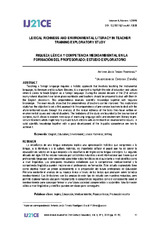Mostrar el registro sencillo del ítem
Lexical richness and environmental literacy in teacher training exploratory study
| dc.contributor.author | Tinedo Rodríguez, Antonio Jesús | |
| dc.date.accessioned | 2020-06-01T19:10:36Z | |
| dc.date.available | 2020-06-01T19:10:36Z | |
| dc.date.issued | 2019 | |
| dc.identifier.issn | 2444-3921 | |
| dc.identifier.uri | http://hdl.handle.net/10396/20065 | |
| dc.description.abstract | Teaching a foreign language requires a holistic approach that involves teaching the instrumental language, its literature and its culture. Besides, it is important to highlight the role of education and values when it comes to teach English as a foreign language. During the second decade of the 21st century many natural disasters have taken place worldwide and teachers should be prepared to deal with them in the English classroom. This preparedness involves scientific knowledge together with linguistic knowledge. The main results show that the preparedness of teachers can be improved. This exploratory study has the objective to set a first approach to the preparedness of pre-service teachers to deal with the aforementioned issues through the analysis of the lexical richness of the texts they have written on environmental issues and natural disasters. The limitations of the study are bounded to the low number of samples, but it allows to explore new ways of improving language skills and environment literacy in preservice teachers which might help to provide future citizens with commitment on environmental issues. A solid scientific knowledge together with a good development of the linguistic competence are key to achieve it. | es_ES |
| dc.description.abstract | La enseñanza de una lengua extranjera implica una aproximación holística que comprenda a la lengua, a la literatura y a la cultura. Además, es importante señalar el papel que ha de cobrar la educación en valores en lo que respecta a la enseñanza del inglés como lengua extranjera. La segunda década del siglo XXI ha estado marcada por catástrofes naturales a nivel internacional que hacen que el profesorado tenga que estar preparado para tratar estas temáticas en el aula tanto a nivel científico como a nivel lingüístico. Los principales resultados establecen que la competencia medioambiental y la competencia lingüística pueden mejorar en el profesorado en formación. Este estudio exploratorio tiene como objetivo hacer un primer acercamiento a la preparación del futuro profesorado de Educación Primaria mediante el análisis de su riqueza léxica a través de los textos que producen sobre temática medioambiental. Las limitaciones son las propias de este tipo de estudio con muestras reducidas, pero permite explorar nuevas vías para mejorar tanto la competencia lingüística como el conocimiento sobre el medioambiente para conseguir formar a una futura sociedad comprometida y sostenible. Una formación sólida a nivel lingüístico y científico pueden ser claves para conseguirlo. | es_ES |
| dc.format.mimetype | application/pdf | es_ES |
| dc.language.iso | eng | es_ES |
| dc.publisher | Universidad de Córdoba, UCOPress | es_ES |
| dc.rights | https://creativecommons.org/licenses/by-nc-nd/4.0/ | es_ES |
| dc.source | International Journal for 21st Century Education 6(1), 41-49 (2019) | es_ES |
| dc.subject | English | es_ES |
| dc.subject | Education | es_ES |
| dc.subject | Environment | es_ES |
| dc.subject | Lexical richness | es_ES |
| dc.subject | Writing | es_ES |
| dc.subject | Inglés | es_ES |
| dc.subject | Educación | es_ES |
| dc.subject | Medioambiente | es_ES |
| dc.subject | Riqueza léxica | es_ES |
| dc.subject | Producción escrita | es_ES |
| dc.title | Lexical richness and environmental literacy in teacher training exploratory study | es_ES |
| dc.title.alternative | Riqueza léxica y competencia medioambiental en la formación del profesorado: estudio exploratorio | es_ES |
| dc.type | info:eu-repo/semantics/article | es_ES |
| dc.relation.publisherversion | http://www.uco.es/ucopress/ojs/index.php/ij21ce/index | es_ES |
| dc.rights.accessRights | info:eu-repo/semantics/openAccess | es_ES |

